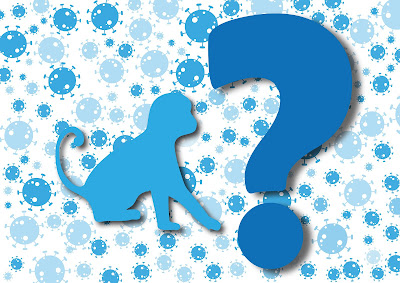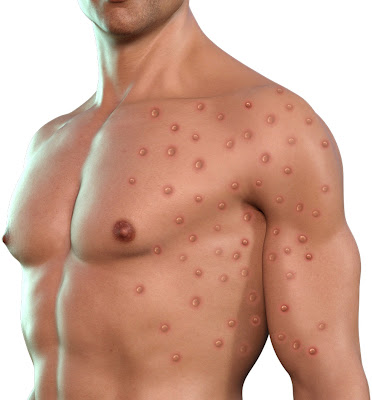 |
| Monkeypox virus; History, Symptoms, causes, and treatment |
Monkeypox virus; History, Symptoms, causes, and treatment
Monkeypox is a rare viral disease caused by the monkeypox virus. Its symptoms include rashes and flu-like symptoms. It belongs to the family of orthopoxvirus. It is most common in Africa but is also seen in areas that have not seen it before.
History:
A continuous flare-up
of monkeypox, a viral disease, was confirmed in May
2022. Initially, cases were reported in the UK, and its first case was reported on 6 May 2022, in a man whose travel history was linked to Nigeria. Initially monkeypox virus spread outside central and west Africa. From 18 May onwards,
cases were accounted for from a rising number of nations and locales,
overwhelmingly in Europe yet additionally in North and South America, Asia,
Africa, and Australia. On 23rd July, the outbreak was declared a Public Health Emergency of International concern, raising its status from an outbreak to a public health emergency.
Most of the monkeypox cases are seen in children who are less than 15 years old. It is most common among those men who have sex with men but also found in many other individuals who do not fall under this category.
Monkeypox is a viral
contamination that shows up to 14 days after exposure with fever and other
vague side effects and afterward produces rashes with sores that typically
keep going for 2 a month before evaporating, crusting, and falling off.
Symptoms:
Monkeypox is a rare virus that resembles with smallpox virus. After exposure to monkeypox, symptoms may take a few weeks to develop. Its early symptoms resemble the symptoms of flu, like;
- headache
- chills
- fever
- fatigue
- muscle aches
- swollen lymph nodes
All of the above-mentioned symptoms do not occur in every patient. Even if you don't have its symptoms, you may pass the virus to other individuals as a result of close contact.
Diagnosis:
Because of its rarity, it can be initially diagnosed as measles or smallpox. It is distinguished from other poxes by swollen lymph nodes. A tissue sample is taken from an open sore for diagnosis. Your blood sample is also needed for the diagnosis of monkeypox and checking the antibodies of your immune system. Monkeypox is not a fatal virus. no death has been reported by it, but it can lead to other problems like infections in the brain or eyes, and pneumonia, which may be fatal.
Causes of monkeypox:
 |
| Monkeypox virus; History, Symptoms, causes, and treatment |
Monkeypox is a zoonotic disease which means that it can be transmitted from animals to humans. It is spread by contact with an infected animal. It spreads through direct contact with broken skin, like bites, scratches, direct contact with the infected animal's blood, other body fluids, and pox lesions of the patient. It may also spread among humans but it is less common. It spreads when direct contact is made with scabs, sores, or oral fluids most probably through kissing, cuddling, or sex. It is not yet clear whether this virus can be transmitted through vaginal fluids or semen.
It can also spread by recently used cloths, bedding, or other stuff by the infected individual or animal.
Treatment and cure
Monkeypox symptoms last about 2-4 weeks. Most of the individuals get healthy on their own without any treatment. Your doctor diagnoses your symptoms and suggests antibiotics to relieve your symptoms and prevent bacterial infection. Try to prevent dehydration. No approved vaccine for monkeypox is available now. You can take antiviral drugs to prevent infection caused by its lesions. If you feel any symptoms of monkeypox virus, then;
- Use painkillers and fever reducers, as they can relieve your pain.
- Practice oatmeal baths.
- Quarantine yourself, if you feel that you have become a victim.
- Try to cover your lesions.
- Take good care of your health
- Try to avoid making contact with your pets.
- Seizures
- Unconsciousness
- Difficulty in speaking
- Difficulty in movement
- Neck stiffness
- Chest pain
- Unclear thinking
In order to prevent monkeypox;
- Try to avoid direct contact with the infected animals.
- Try to avoid yourself from the things used by the infected person.
- Cook all the foods thoroughly which contain animal meat.
- Wash and sanitize your hands frequently.
- Make sure the use of a mask to cover your face and mouth.
- Follow SOPs and self-protection measurements.








If you have any doubt, let me know.